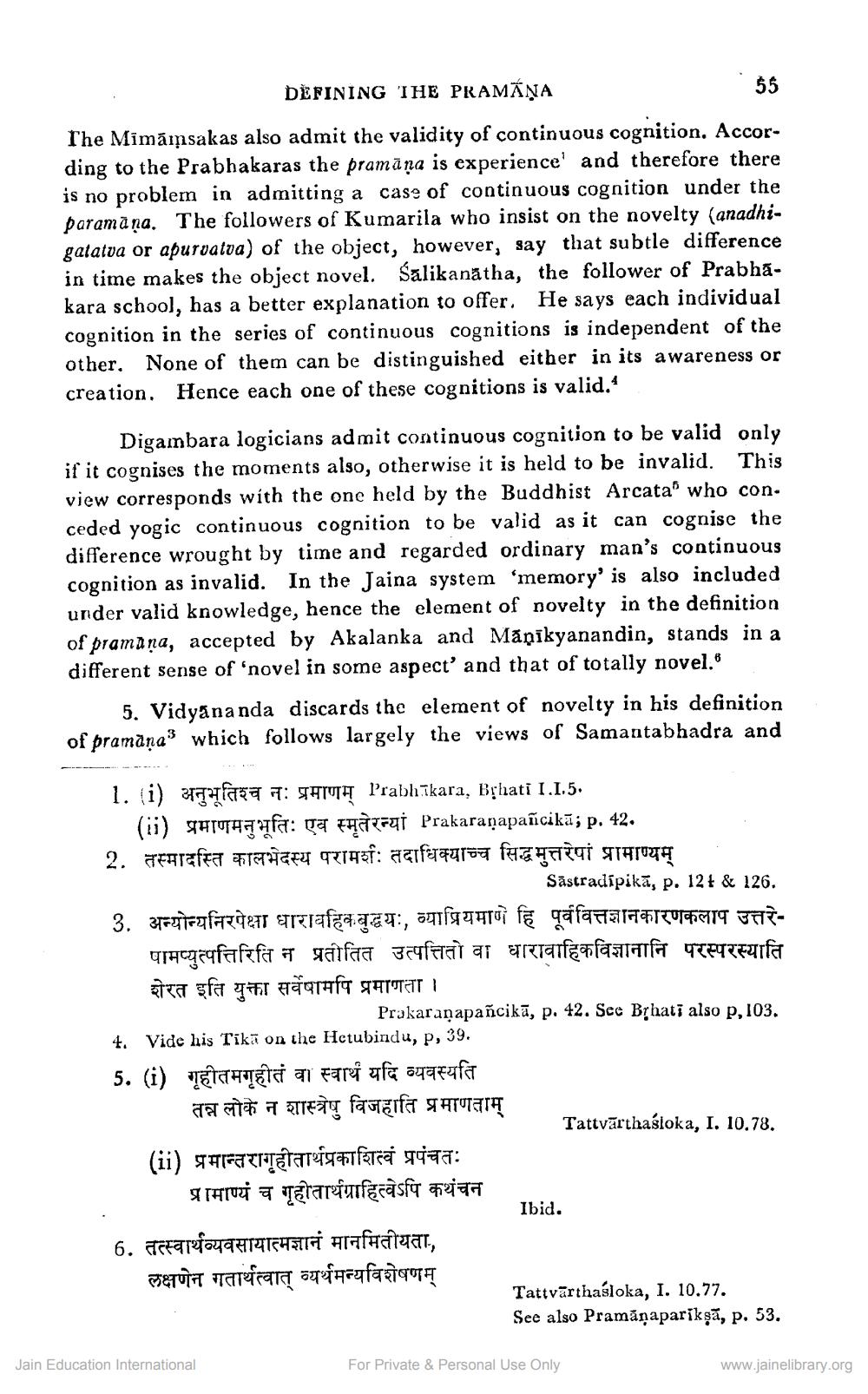________________
DEFINING THE PRAMÁŅA
55 The Mimáiņsakas also admit the validity of continuous cognition. According to the Prabhakaras the pramāņa is experience and therefore there is no problem in admitting a case of continuous cognition under the paramāna. The followers of Kumarila who insist on the novelty (anadhigatatva or apurvatva) of the object, however, say that subtle difference in time makes the object novel. Salikanātha, the follower of Prabha. kara school, has a better explanation to offer. He says each individual cognition in the series of continuous cognitions is independent of the other. None of them can be distinguished either in its awareness or creation. Hence each one of these cognitions is valid.4
Digambara logicians admit continuous cognition to be valid only if it cognises the moments also, otherwise it is held to be invalid. This view corresponds with the one held by the Buddhist Arcata who con. ceded yogic continuous cognition to be valid as it can cognise the difference wrought by time and regarded ordinary man's continuous cognition as invalid. In the Jaina system 'memory' is also included under valid knowledge, hence the element of novelty in the definition of pramaņa, accepted by Akalanka and Manikyanandin, stands in a different sense of 'novel in some aspect' and that of totally novel.
5. Vidyana nda discards the element of novelty in his definition of pramāņa3 which follows largely the views of Samantabhadra and
1. i) अनुभूतिश्च नः प्रमाणम् Prabhrkara, Brhati I.I.5.
| Prakaranapaficika; p. 42. 2. तस्मादस्ति कालभेदस्य परामर्शः तदाधिक्याच्च सिद्ध मुत्तरेषां प्रामाण्यम्
___Sastradipika, p. 12t & 126. 3. अन्योन्यनिरपेक्षा धाराबहिक बुद्धयः, व्याप्रियमाणे हि पूर्ववित्तज्ञानकारणकलाप उत्तरे
पामप्युत्पत्तिरिति न प्रतीतित उत्पत्तितो वा धारावाहिकविज्ञानानि परस्परस्याति शेरत इति युक्ता सर्वेषामपि प्रमाणता।
Prakaranapañcikā, p. 42. Sce Brhati also p, 103. 4. Vide his Tikā on the Hotubindu, p, 39. 5. (i) गृहीतमगृहीतं वा स्वार्थ यदि व्यवस्यति तन्न लोके न शास्त्रेषु विजहाति प्रमाणताम्
Tattvarthasloka, I. 10.78. (ii) प्रमान्तरागृहीतार्थप्रकाशित्वं प्रपंचतः प्रामाण्यं च गृहीतार्थग्राहित्वेऽपि कथंचन
Ibid. 6. तत्स्वार्थव्यवसायात्मज्ञानं मानमितीयता, ___ लक्षणेन गतार्थत्वात् व्यर्थमन्यविशेषणम्
Tattvarthasloka, I. 10.77. See also Pramanapariksa, p. 53.
Jain Education International
For Private & Personal Use Only
www.jainelibrary.org




